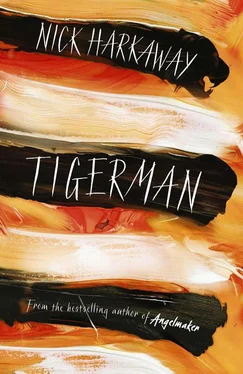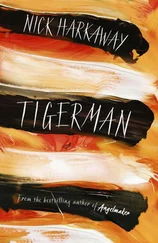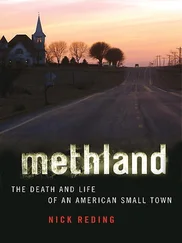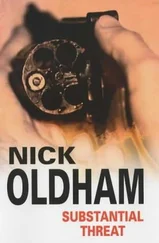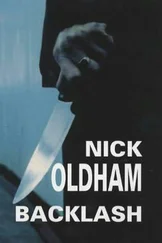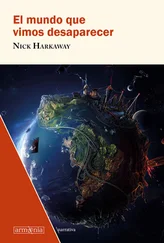When he woke he was cold, and he knew he was in the cemetery where Shola was buried, and that he had come to say another goodbye, to apologise, and that he had lost another friend in this life and hadn’t enough to be giving them away. He made a noise, head in hands: wordless sorrow without the stamp of appropriate grieving moulded onto it. He looked for the fresh grave, entertaining a mad fantasy of digging it up, of waking Shola even at this late date, getting him to a proper hospital where they could treat his injuries. No, not a proper hospital: the Fleet! The Fleet could help him. They must have everything there, all the impossible new medicines, machines to pump his blood, machines machines machines. They could give him a new lung, a new heart, a new spine, grow new bones or steal them from someone else. They could do anything, if they wanted. Anything at all.
A scent washed over him, strange and sharp. It was warm and not unpleasant: leaves and bark, yes, and sweat. An animal smell. A neighbourhood dog, he thought, and awaited the wet nose in his ear. Well, that would be nice. Companionship. Dogs were good companions. They had no solid memory, only a sort of endless now. A happy dog was happy almost all the time, and shared that with you, which he could use about now.
The nose did not arrive. The dog butted him gently, quite high on his back. A large dog, or a smaller one on its hind legs. It sighed, and the noise was amazingly loud in the night. He wondered if his own sigh had been quite so massive, if he had woken anyone. He felt that any dog with that much heart should be rewarded with a hug.
He turned around into a completely alien intelligence, a huge soup-plate face with wide, reflective eyes. They were not yellow or green but a scalding platinum. He smelled meat and musk, tasted it in the air.
The tiger blinked. It was enormous. They were supposed to be smaller. They were supposed to be shy, too. Perhaps this one was lonely. The head was on a level with his own as he sat, and bigger. The whole animal must top three hundred kilos. He’d been part of four-man squads which didn’t weigh that much.
It peered at him, neither skittish nor aggressive but imponderable. It snuffled, and he smelled that same scent again, stronger: warm saliva and fur. It sneezed. Tiger snot spattered his chest. He did not cry out. The tiger looked almost embarrassed, butted him again.
Well, dog or not, it seemed to want to know him. He reached out very slowly with his left hand (in case it was torn off). The tiger twitched back from it, then sniffed the offered limb and found nothing to object to. It suffered him to stroke it. The fur was thick and dark, heavy with oil. He wondered whether to scratch it. Domestic cats liked to be scratched. His mother’s had. The tiger had taken the initiative, though, and was pushing upwards under his palm. He scratched. Its eyes closed, and it made a new noise, like a distant avalanche. Purring, he supposed, though it seemed a ridiculous word to describe this sound which was almost too deep to hear.
Time passed. The Sergeant’s left arm grew tired and he substituted his right. Then his right arm grew tired and he slowed and stopped. The tiger whickered reproach. He shrugged. It considered him and accepted the verdict, then wandered away. He was for a moment forcefully reminded of the boy. Conversation over, see you next time . He watched the animal make a slow circuit of the graveyard. He thought it might make a special pilgrimage to Shola’s plot, a sort of omen, but it didn’t and he was obliquely glad. Then, without meaning to, he shut his eyes for a moment and it was gone. He came upright and opened his mouth to call after it, then stopped: he had no idea what he would say. He realised he had been in some way hoping for its approval.
He took two or three steps forward, hoping to catch a glimpse of it by the trees.
HE STRUGGLED THROUGH the next morning because there were things to do, things which couldn’t wait a day however awful he felt. He got up. It wasn’t pleasant. He ate some soup, wished he hadn’t. It swilled around in his stomach as if he was a hollow plastic sack. He knew better than to add bread. It would swell and make him feel bloated and leaden.
The weather was stubbornly ordinary. The natural world was remorseless about human death and just rolled on. Some people took solace in that, in the continuance of a greater cycle, but the Sergeant had found that he did not. Death was bad, and that was all. It was not a mercy, not a release, not a victory, and there was no more joy in a man becoming food for worms than in a chicken becoming food for a man.
He waited for the soup to recede, then took himself out for a run. He pushed himself through the blinding headache and on until he felt the jelly in his legs fade and the poisons in his blood bubble out through his skin. He stank. Tainted sweat fell from his body onto the track, and he wondered if it would make any difference to the cocktail of slurry and strangeness under the island. Booze metabolites and skin, salt and water, filtering down through endless layers of sand and rock to a weird melting pot somewhere down below. He showered, and midway through, as the water spiralled away down the plughole, he abruptly found the notion enormously alarming. He was giving up tiny parts of his physical self to be assimilated by what was under the island, would become part of an alien thing so dangerous that only total war could be contemplated, an annihilation so fierce it would take the stone and the sea with it. He retched, but nothing emerged from him. He allowed himself two ibuprofen tablets from supplies, logged them, and chased them with more water and a sachet of electrolyte salts intended for treating severe diarrhoea. Finally he added a multivitamin and a single bit of crispbread from the larder to settle his stomach. The mixture was sickly, but he knew it would work.
Dressed and dry, he took himself out to the car. He had prisoners to talk to: Kershaw was keeping them for him.
Beauville did have a prison — an old red Victorian box with narrow, barred windows and a high wall — but it had been commandeered by NatProMan to house its overspill, and was now full of administrators, soldiers and a considerable stock of weapons. Serious criminals — of which there had not been many — had been transferred to prisons in the Scandinavian countries where the crime rate was actually dropping so fast that the prison infrastructure industry was having trouble staying afloat. Denmark had been a net importer of criminals since 2011.
It had been understood that the island wasn’t going to last long enough for the lack of a prison to be a problem. Except that it had, so the Sergeant, five months into his role as Brevet-Consul, had persuaded Jed Kershaw to fix up an empty wooden building at the far end of the waterfront which had once been a fish-packing plant. The jail wasn’t secure by any modern standard, but the refrigeration units were big enough to serve as cells and you could lock them. A team of engineers had drilled holes in the sides so that the prisoners did not suffocate, and had turned off the cooling system so they did not freeze. Until yesterday it had housed only a few serial brawlers and an aged flasher.
The boy was sitting on a low wall with his knapsack, waiting. When he slipped down from his perch and walked across the cracked stone to the Sergeant’s position, he did so with such an air of formality that the Sergeant briefly saw him dressed in a lawyer’s wig and gown: five feet tall and making the case for the prosecution, or even pronouncing sentence. He had gathered the straps of the bag in his left hand and carried it like a briefcase.
The Sergeant had been aware that this was coming, that the boy would inevitably wish to confront Shola’s killers or at least to confront the tangible fact of them. He had decided that he would not argue. Perhaps he should, but in his mind it simply would not be fair — not comprehensible, either to himself or, he felt sure, to the boy — to claim now, when it was safe, that the matter was too grown up, too serious for him to handle. It might have been possible before Shola’s blood had spattered his face. Not after.
Читать дальше
Конец ознакомительного отрывка
Купить книгу
